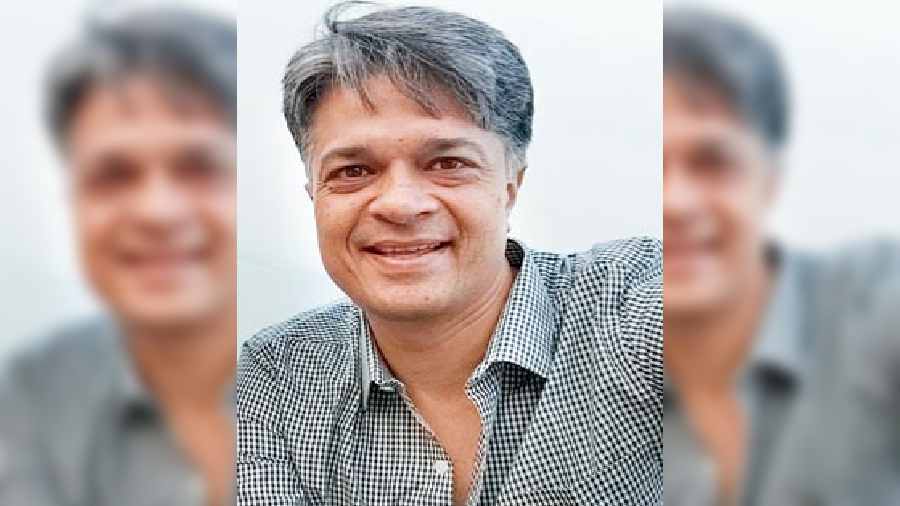A new podcast is on Spotify and the focus of Dear Teenage Me are youngsters or Gen Z, who have issues to discuss, messages to share and feel connected. All of this gets achieved on the show hosted by Ahsaas Channa and produced by Yuvaa Originals. But Spotify is not stopping at that because podcasts are “here to stay”. “Audio is a very natural way to consume content — it’s about talking to someone. In India we have a deep history of listening to oral stories,” says Dhruvank Vaidya, head of podcasts, Spotify India.
Here’s more from Dhruvank, a father who is learning the lingo of the new generation from a 14-year-old teenager, who keeps him young.

Dhruvank Vaidya, head of podcasts, Spotify India
What was the genesis of Dear Teenage Me?
Gen Z forms a big part of our listener base. We were thinking of what to do for them and where does audio fit in. You have so many video platforms and so many social media platforms, so there is a lot to keep a person engaged. But when we tried to understand user behaviour and found that there are not a lot these spaces where one can be authentic. That’s where audio comes in. When you’re listening to a podcast or any spoken-word audio, you have a more intimate connection with the content. It’s a one-to-one relationship that you establish with the content. So the kind of content we can cover in audio is very different and deep, but it can be deeper; it can be more meaningful. We thought of doing a show where we actually bring forth conversations that the younger generation is happy to have but they don’t know whether they are alone or are suffering on his or her own or are there others who’re feeling the same. That was the genesis of Dear Teenage Me.
We often hear that youngsters have short attention span and they move from one show to the other….
I think it’s content which is much more important and I wouldn’t make a blanket statement about the attention span of Gen Z. The format of this podcast is such that… it’s like each episode is six to eight minutes long. We are dropping two episodes a week. Just to make sure that people come back to the show every few days. The idea is to build a habit around it (the show). At the same time, we’re doing a whole bunch of stuff around marketing on social media and so on. To start a conversation on social media, we are inviting a lot of people to come and submit their questions. Come, talk to us… reach out to us.
How did you about finding what youngsters want to listen to?
It’s not so much about the stuff that we don’t know about. What we wanted to do with the show was… there are a lot very well-known people talking about their lives. Our idea was to say, “Look, these are people you see on digital or social media. But these are also people who are very much like us and these are their stories. Somebody has a story about his or career, somebody has a story about heartbreak. They are facing emotions that you would also face on your own. But you need not be alone. That’s the bigger attempt of the show.
How far does Spotify want to expand into the Gen Z universe?
On Spotify, we are looking at Gen Z across multiple shows. Last year we launched this show called The Mythpat Podcast. Mithilesh Patankar does videos and we got him to do a podcast for us. He spoke about his friends, his experiences. And that was the perfect Gen Z audience he was talking to; a lot of the conversations he has involves stuff that resonates with our audience. Our Spotify podcast-listening audience is quite young, so that was a big advantage. We’re trying to programme across multiple genres – gaming, knowledge and learning, mental wellness, relationships and romance… these are kind of stories that they would like to explore.
It’s been three years of Spotify in India. Where do you see podcasts?
Podcast has done immensely well in India. A lot of creators who are on YouTube and Instagram are invited to do podcasts. At times we receive screenshots (of messages) saying that a podcast has brought an immense level of comfort. Podcasts are forming a part of someone’s daily life. Podcasts are creating a niche for themselves. These are beautiful moments that inspire us. Podcasts are here to stay and people are going to consume more of it; audio is a very natural way to consume content – it’s about talking to someone. In India we have a deep history of listening to oral stories.
Where do you want to see podcasts in the future?
We are used to switching on the TV and watching an old show almost every day. You will watch the TV, even if it involves browsing for five minutes. Podcast is yet to reach that level when everyone puts on a headphone and listens to something every day… any content. We want to make it a daily routine for listeners.
